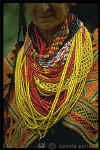|
|
||||
| Home
JUNE 2001- Contents Culture Sports Health Lifestyle Visual Arts People Travel & Adventure
|
|
|
||
|
the-south-asian.com June 2001 |
||||
|
Page 6 of 6
The Kalasha of Pakistan (cntd) Problems of Minority Development and Environmental Management By Peter Parkes Conclusions In conclusion, I might be expected to offer some constructive opinions on the subject of Kalasha indigenous knowledge and current development policies in their valleys. Having visited their communities repeatedly over the past twenty-five years, I well recognize my own ineluctably ‘romantic’ sentiments concerning Kalasha traditional culture, and also disgust at the apparent indignities of exploitative tourism, as well being concerned about possibly irreversible environmental devastation stemming from commercial forestry in their valleys. But like Saifullah Jan, I also recognize the local value of responsible development initiatives such as the Aga Khan Rural Support Programme, while having obvious doubts about many other well-intentioned private NGO or government conservation projects. But from a more detached perspective, I wonder whether all imposed development programmes among such minorities unwittingly amplify - with indigenous connivance – socially deleterious consequences, which are now increasingly perceived by many Kalasha leaders. That is, they tend to retrench local knowledge as 'indigent knowledge' and conversely inhibit an 'indignant knowledge' demanding self-determined development; and they also tend to incite acrimonious factional conflict among leaders and resentments over lucrative resources, ultimately undermining extant institutions of collective resource management and reciprocal support. It is an often unwelcomed duty of an anthropological observer of development to point out these unwanted processes - which nobody clearly intended - rather than collude in a benevolent outside dissolution of fragile local communities, with evidently functioning institutions of collective resource management. Yet the future viablility of Kalasha communities ultimately depends on the continuing efforts of local leaders like Saifullah Jan to mobilize struggles for an independent control of environmental resources, which often appear more sustainably managed in indigenous hands, given proper governmental support, than through the best-intentioned schemes of outside development agencies. ____________________
All photographs are courtesy
Yannis Psilakis.
References
Alauddin (1992). Kalash. The Paradise Lost. Lahore: Progressive Publishers. Frembgen, J. (1993). Die Sehnsucht nach dem irdischen Paradies: Ethnotourismus zu den Kalasha. Internationales Asienforum / International Quarterly for Asian Studies, 24(1-2), 45-56. Parkes, P. (2000). Enclaved knowledge: indigent and indignant representations of environmental management and development among the Kalasha of northern Pakistan. In R. Ellen,P. Parkes, & A. Bicker (Eds.), Indigenous Environmental Knowledge and its Transformations: critical anthropological perspectives. Amsterdam: Harwood Academic, pp. 253-91. Robertson, G. S. (1896). The Káfirs of the Hind-Kush. London: Lawrence & Bullen. Rovillé, G. (1988). Ethnic minorities and the development of tourism in the valleys of north Pakistan. In P. Rossel (Eds.), Tourism: manufacturing the exotic. Copenhagen: International Work Group for Indigenous Affairs, pp. 147-76. Saifullah Jan (1995) Development and self-determination: a Kalasha point of view. Paper delivered at the 3rd International Hindu Kush Cultural Conference, Chitral. Forthcoming in Israr-ud-Din (ed) Proceedings of the 3rd international Hindu Kush Cultural Conference. Saifullah Jan (1996). History and development of the Kalasha. In E. Bashir & Israr-ud-Din (Eds.), Proceedings of the Second International Hindu Kush Cultural Conference (pp. 239-46). Karachi: Oxford University Press.
|
||||
| Copyright © 2000 [the-south-asian.com]. Intellectual Property. All rights reserved. | ||||
| Home |

